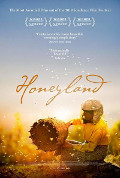
Directed by
Ljubomir Stefanov / Tamara Kotevska
85 minutes
Rated G
Reviewed by
Bernard Hemingway

Honeyland
Synopsis: A beekeeper (Hatidzhe Muratova) living in the barren hills near Skopje in Northern Macedonia finds her occupation and way of life threatened by a greedy neighbour.
That Ljubo Stefanov and Tamara Kotevska’s film, which has won a truckload of awards, was nominated in both the Best Documentary and Best Foreign Feature Film categories gives you some idea of the quality and breadth of the film. It is a fly-on the-wall study of the life of its central character, Hatidzhe, an eco-allegory, and a wry and sad reflection on human nature.
Honeyland opens with a single woman trekking across a rocky landscape to a wild beehive from which she collects honey which she then takes to market in Skopje to sell, its superior quality much appreciated by her customers. It is a hard life, particularly as Hatidzhe has also to look after her bed-ridden mother. Nevertheless she is content and finds simple pleasures within the narrow confines of her daily routine.
One day a family moves next door to her. As if wandered away from an Emir Kustarica gypsy film they bring squawking children, a menagerie of farmyard animals and a complete lack of concern for anyone but themselves. In short measure the husband starts his own domesticated bee farm. Ignoring Hatidzhe’s advice to take only half of the honey for himself and to leave half for the bees in order to maximize his profit he sells all his honey to a travelling wholesaler, even helping him to destroy a wild hive to get as much honey as possible. The orphaned bees attack Hatidzhe’s bees, killing them. Only her hive in hills survives but will Hatidzhe?
Bees are, of course, regarded as key indicators of global ecosystemic health and Honeyland is at once a mirror of the human rapacity and stupidity that is destroying that balance and a poignant microcosmic demonstration of its occurrence. Well-aided by cinematographers, Fejmi Daut and Samir Ljuma and a completely non-professional cast the directors have fashioned a film that is visually beguiling, emotionally moving and morally committed but without a trace of didacticism. It’s a sophisticated combination that you are not likely to forget in a hurry.

Want more about this film?


Want something different?




